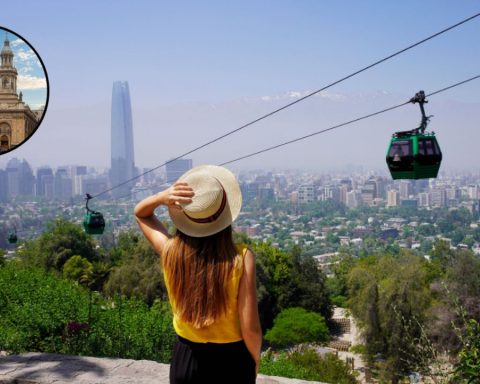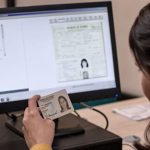What happens to adults with mental disabilities when they turn 26?
They stay flying, hanging from a lamp.
Special schools do not receive people older than that age and our social assistance system has a very poor offer, in terms of programs that can alleviate the burden of care for their families. And, above all, and most importantly, where these adults with intellectual or psychological limitations can socialize, train, integrate.
The shortage becomes even more critical in the case of poor and vulnerable men and women, where many times the perpetual destiny is confinement in the last corner of the house.
The Day Center that Hogar de Cristo has in Quinta Normal is one of those few spaces. There these people – between 18 and 60 years old – have a stimulating and free place to get the best of themselves, live with others and lighten the burden on their caregivers.
With capacity for 60 adults, this Monday we find the performance workshop bustling with activity in the old and spacious house on Calle Padre Tadeo. There are 15 actors and actresses dressed up, rehearsing the play that they will present to their families at three in the afternoon.
There is also María Eliana Urquizar (57), the social worker in charge of this and three other programs focused on mental disabilities that work here: a Sheltered Home, which houses 7 permanent residents; the Program for Independent Living, which cares for 45 people who, despite their disability, are capable of living independently and even working; and a PAFAM, which offers emotional support and practical help to caregivers of adults with intellectual or psychological problems. It is an outpatient facility that supports families in the communes of Maipú and Estación Central, visiting them regularly. It’s free and there are vacancies. For more information, you can call the number 9 92258842.
Regarding the Day Center, María Eliana notes that “in all of Santiago Poniente there is no other equivalent option for these people.” An unfortunate issue, because as the professional says: “This allows them to develop social skills, so that those who care for them can work, and even find work themselves.” And she adds other more intangible benefits, but equally important:
–By being with others, they manage to internalize respect for diversity. In an initial stage, those with psychiatric disabilities discriminated against those with intellectual disabilities. That happened right here. But when they begin to relate, they meet, they accept each other, respect for the other is installed. Truly here they manage to reconnect with others and bond with the community.
–How is that link with the “normal” (starting from the basis that, as Caetano Veloso says, “nobody up close is normal?
–Many of the things we do are in public spaces in the neighborhood of the commune, precisely to integrate them. We go to the Quinta Normal Library; to the Casona Dubois, which is a very nice cultural center; CORMUDEP, which is a gym. There it happened that, initially, the women, the neighbors, who were going to do aerobics, walked away, ran away when we arrived. Out of fear, out of mistrust. But, little by little, they were discovering them, realizing that they were not risky or dangerous people, because mental disability arouses many prejudices, basically due to ignorance. Now our boys are part of the group, there is no distance. They recognize and appreciate them. In that case, I have seen an effective inclusion approach.
With María Eliana we imagine a kind of sponsorship or cultural volunteering. Someone to take one of the Day Center adults with an artistic sensibility on a regular basis to exhibits or shows or a movie. That another invited another to drink coffee and tour heritage neighborhoods. We dropped the idea…
The professional knows that it is key to make these adults visible, who have often been hidden by their own families due to prejudice, shame and the stigma that mental disability entails. Although among our interviewees there are several, where the effort of their parents or relatives, despite all the economic and social adversity they face, is admirable.
We invite you to know what the “actors” of the Quinta Normal Day Center are like. Listening to them is the most efficient way to connect with this tremendous deficiency that our society and our State have: lack of inclusion, especially of mental disabilities.
Sergio Cubillos (51), has been coming to the Day Center on Padre Tadeo Street for four years. He does it on foot. He says that the workshops help him to develop positive thoughts “and not to go around thinking about harm.”
He says that he is medicated for life, that he was educated at the Liceo Amunátegui and that he only reached the third grade, because at the age of 17, “I began to have complex ideas. That’s where my illness started. I’m schizomorphic and that means I have hallucinations, things like that. But the medicines help me. And come here too. The worst stage of my life was when I was in the Psychiatric Hospital. It was horrible. Here, on the other hand, I normalize my thoughts, this helps me focus and use my head to focus on what is good about myself. At the Day Center we assist people with mental illnesses, intellectual deficiencies, and doing so helps us to strengthen our self-esteem, self-care, autonomy, as far as possible”.
Sergio lives in the commune of Santiago in “a small apartment that I share with my older brother. He is a craftsman. Each one has his bed on one side of the apartment and we have a central space. He manages my pension.”
It is not because Sergio does not know how to handle money, he assures, but because they manage everything with a debit card and his brother gives him what is necessary for his day to day. “I need the minimum and I have enough,” he says, rubbing his eyes and clicking his tongue in that characteristic tic of those who take drugs that dry out the mouth.
“I have worked a few times: as a worker, selling courses, as a stocker in supermarkets. That’s what I liked the most. I feel capable of working and I dream of doing it, and of sleeping peacefully. What more can I ask for? That and not thinking silly things, nor saying them. I’ve made a lot of progress here. We are all friends. We help each other, we love each other, we laugh at life and at those who touched us”.
Twenty, forty, sixty years old have the granddaughter, the daughter and the mother, who have lived together for 15 years in a house with mortgage debt in Cerro Navia. The mother is Rossana Lagos (60), a woman with a mental disability, who –against all odds– managed to raise her daughter, who is a business administrator and works in a bank, and together with her granddaughter, who is studying obstetrics in a university in Las Condes.
Three single women who face a difficulty typical of the times: a family that deals drugs has settled in the neighboring house. “They are drug dealers. They shoot fireworks. They fire shots into the air, on weekends, when they know my daughter is there, they play the music at full volume, especially at night. And we have a low tambourine, which leaves us helpless. You have to arrive, enter and lock yourself in”, narrates Rossana.
She has been coming to the Day Center for 3 years. “My daughter signed me up and she helps me a lot. Here I have friends and friends, I feel accompanied, since in my house I am alone almost all day”.
Unfortunately, the insecurity that has settled in their lives since their new neighbors arrived prevents them from going to the Center every day. “I only come on Tuesdays and Thursdays, so as not to leave the house alone, and I regret it, even more so now that there is going to be a work preparation workshop,” he says.
Rossana, despite her difficulties, her mental disability, the pills she takes, declares herself “proud of my daughter and my granddaughter. Both are professionals or will be, in the case of my granddaughter, who studies with a scholarship and is doing very well. I would have wanted to study, I would have liked to be a teacher, but I only got up to seventh grade. I had to go out to work because of the economic situation at home. Do you remember when the cards had paper photos? I worked to take clients to the photographic studio near the Civil Registry. That did. Now I just cook. For three. And the best thing for me is the beans”. Either with reins or pomegranates with mazamorra. It all depends on the season.
This Jaime Milla (37), who has the sweetness of a child, is about 90 meters tall. He is from Cerro Navia and says that he came to the Day Center on the recommendation of the therapist at the Salvador Allende Health Referral Center in his commune. “He said it would serve to distract me, to clear my mind. And it has been so. I’m better now. I only take one pill a day and not several, many, like before, which used to make me sleepy, sleeping, taking pills”.
Jaime finished fourth grade and went to work as a “lentil and rice packer in a distributor. I worked two months no more; then they fired me. There were a lot of applicants.” He has a pension managed by his parents, both retired. “The three of us get along well. We watch TV series, we go out together to buy, to the fair, to the supermarket. We love us”. He says that he exercises, both at the Day Center and at his house and in the nearby park. “It worries me that there are so many obese people. That’s bad, that’s why I exercise.
Once she has only had a crush, but “it went wrong, she betrayed me, she left with someone else,” she says with her beatific smile and takes the drama out of the case by saying: “It was at school, it didn’t hurt, it wasn’t important” . Those were the years when his classmates nicknamed him “The Staircase”, so high up.
Now his colleagues from the Day Center do not have a nickname for him, but they do have a lot of affection.
María Aravena does not know how to tell us her age, but as she narrates her story, we deduce it. She was a mother at 15 and has a 14-year-old son who, like her, has an intellectual disability. At 29 years old, she lives closely with her mother in a room in an aunt’s house in Pudahuel. Her son is in the care of one of her sisters in Puente Alto; it is she who administers the disability pension.
-My son’s father left, because he hit me a lot, that’s why he left. Juan, who is called, deposits my mother 40 thousand pesos for the child. I live with my mom. She does the cleaning, cooks, I make my bed, I serve myself breakfast, sometimes I go buy bread for everyone in the house. I know how to handle money, but my mom sees my retirement money. And my sister takes care of my son’s.
Does he also have an intellectual disability?
-Sebastián is like me, the same. He can’t read or write either. I learned something in the special school, but it was very difficult for me. He goes to the Puente Alto special school and is chubby.
Since she does not know how to read, María cannot move alone around the city in public transport, which makes it difficult for her to work. Today she explains that she is a stocker in the store that another of her sisters has. “I replace drinks, juices, yogurts. I put things in order; that’s what I’m doing”.
When we talk about the future, despite its simplicity, Maria becomes anguished. She cries and, at the same time, she speaks, saying: “If my mom gets sick, who will take care of her. I will be in the air. No one is going to take care of me; the little girls, my sisters, have their own families. And I am worried about my son too, but above all about my mother, because she is in poor health.”
María changes her tone, her mood, when she talks about Efraín, her boyfriend. She met him at the Day Center. He lives in the Protected Residence, which is next door. “He’s cute,” she says, wiping away her tears, and showing us the flirty ties she made in the crafts workshop, to assemble the pom-poms that they will wave happily at the artistic presentation at three in the afternoon.


















